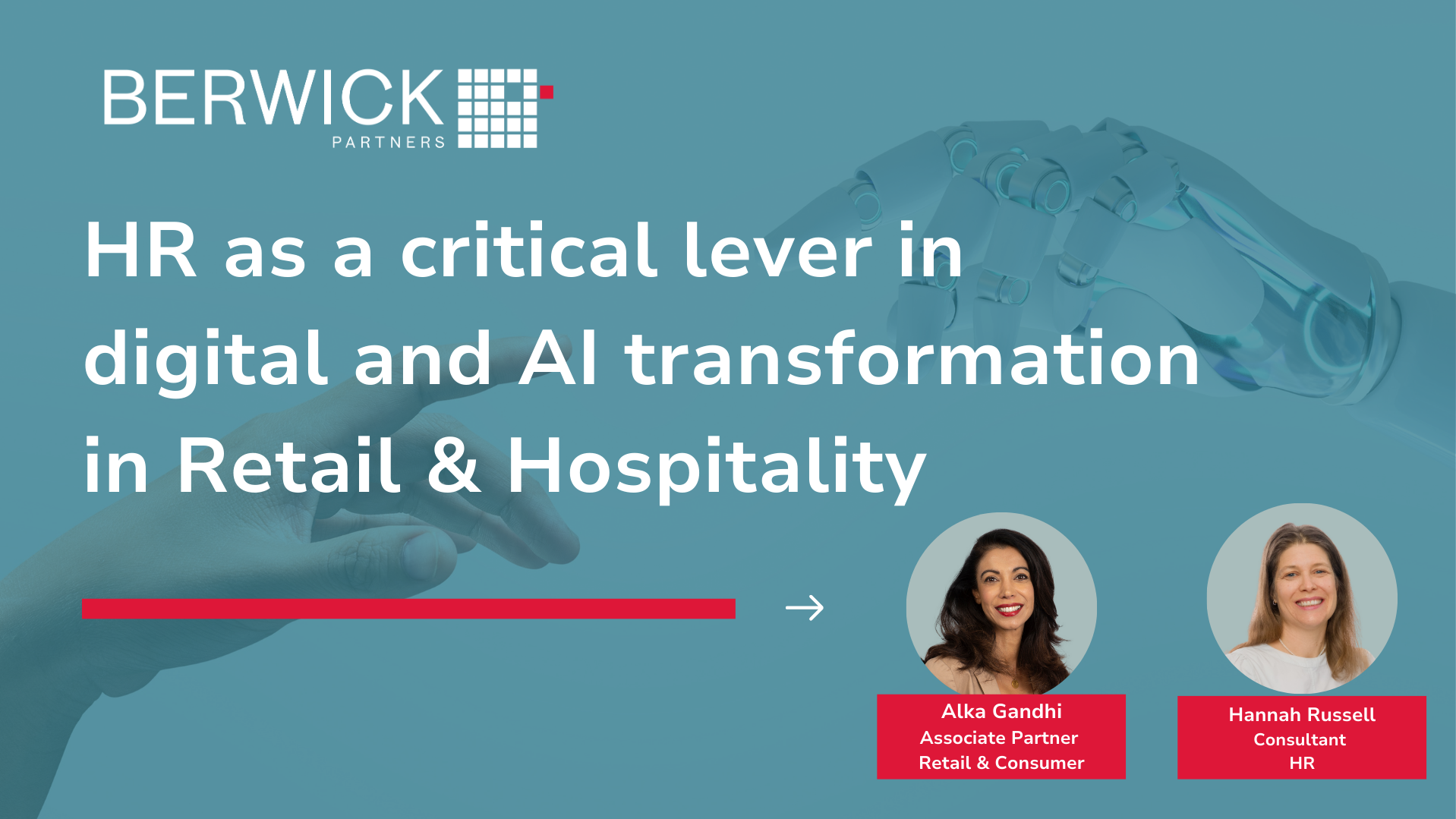HR as a critical lever in digital and AI transformation in Retail & Hospitality
Retail and hospitality are undergoing rapid, often radical, change. New technologies are redefining the customer experience, from AI-curated recommendations to immersive service journeys.
But transformation is no longer just about technology. It’s about the people who bring that technology to life. In our work with leaders across these industries, we’ve seen a growing awareness that HR is not just supporting transformation – it’s powering it.
In this article, we explore:
- Why digital transformation is now a human challenge, not just a technical one
- The specific ways HR is enabling business-wide transformation in retail and hospitality
- Why trust, communication, and capability-building matter more than tool selection
- And what C-suite leaders need to understand about the new role HR plays in commercial success
Whether you’re leading a transformation programme, managing a frontline team, or hiring the next generation of leaders, we believe the insights below will shift how you view the role of HR in digital success.
Digital Transformation Starts with Leadership – but Succeeds with People
Across retail and hospitality, digital innovation is no longer optional. Mobile-first platforms, AI-powered operations and data-rich customer insights are becoming standard. Yet the success of these tools depends less on the tech itself and more on how well people are prepared to use it.
Retail and hospitality leaders are grappling daily with how to integrate AI into their business – not just to cut costs, but to personalise loyalty, increase speed and enhance the end-to-end customer journey. But they’re also honest about the challenges: resistance to change, skill gaps, and a workforce that feels unsure how to adapt.
HR’s Expanding Role
1. Shaping a Culture That Can Embrace Change
It’s no longer enough to introduce new systems – leaders must build cultures where teams can adopt and adapt.
HR is leading this cultural shift by:
- Encouraging psychological safety around experimentation
- Supporting learning over perfection
- Creating open communication channels around change initiatives
The most successful rollouts we’ve seen – whether it’s digital booking systems or AI-based scheduling – have one thing in common: HR has been at the table from day one, helping shape not just the message, but the mindset.
2. Planning for Capabilities, Not Just Job Titles
HR leaders are proactively conducting skills audits, rethinking development pathways, and focusing recruitment efforts on adaptability and learning potential rather than just experience. In some of the best examples, HR has partnered with commercial leaders to build internal learning academies focused on digital confidence.
This shift – from hiring for roles to building for capability – is one of the most important strategic levers HR can pull.
3. Leading Through Example
The most credible HR teams are digitising themselves.
They’re automating workflows, embedding analytics and redesigning employee experience journeys to reflect the same principles they want to see in customer-facing functions.
4. Supporting Enterprise-Wide Adoption
Every major system rollout, from AI-driven product recommendations to automated guest check-ins, hinges on user adoption. HR is the function best placed to ensure these tools land well across teams.
That support comes in many forms:
- Tailored upskilling programmes
- Organisational design that fosters a collaborative environment
- Change management frameworks
- Ongoing communication between leadership and frontline teams
It’s no longer just about getting people trained. It’s about ensuring they’re engaged, equipped and aligned with the company’s broader strategy.
Trust Is the Differentiator – Not Technology
AI, in particular, brings both opportunity and risk. Done well, it can free up teams to focus on human connection – the very essence of hospitality and service retail. But when rolled out without explanation or context, it can erode trust.
employees are involved in how AI is introduced – with clear guidelines, transparent communication and human oversight – they’re far more likely to trust and embrace it. When they’re not, disengagement and resistance quickly follow.
Businesses can lose momentum not because of the tool itself, but because people didn’t understand why it was being used or how it would affect their roles. HR plays a vital role in bridging that gap.
From the C-Suite to the Shop Floor: HR as Strategic Partner
The best HR teams are now working alongside the C-suite to shape long-term strategy. In organisations where transformation is working:
- HR is involved early in digital planning
- People data is informing business decisions
- Learning and capability-building are tied directly to customer outcomes
Final Thoughts
We believe we’re at a tipping point. In both retail and hospitality, the businesses that thrive in the years ahead won’t just be those with the most sophisticated tech stacks – but those that know how to build and support agile, human-centred teams.


